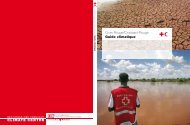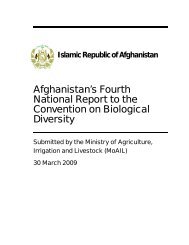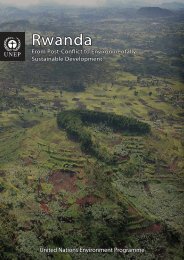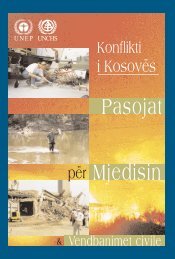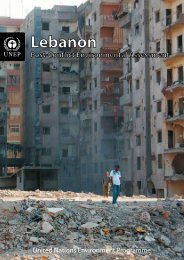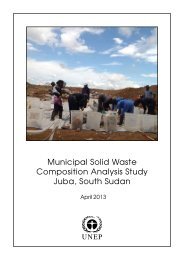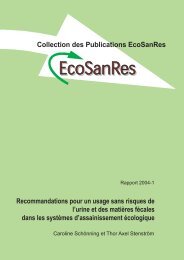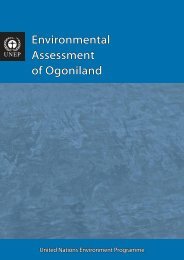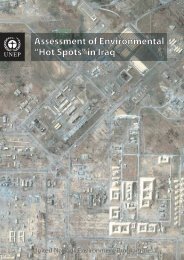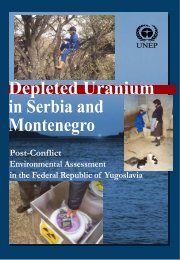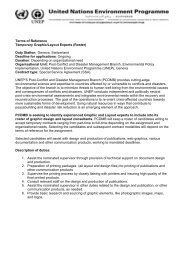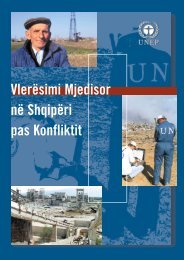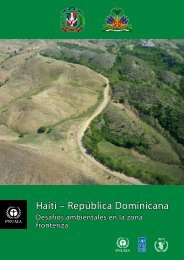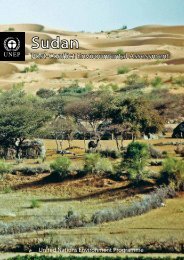Haiti – Dominican Republic - Disasters and Conflicts - UNEP
Haiti – Dominican Republic - Disasters and Conflicts - UNEP
Haiti – Dominican Republic - Disasters and Conflicts - UNEP
- No tags were found...
Create successful ePaper yourself
Turn your PDF publications into a flip-book with our unique Google optimized e-Paper software.
ForewordThe joint management of transboundary natural resources: a first step towards the resolution ofbinational environmental <strong>and</strong> social conflictsThe issues in the border zone of <strong>Haiti</strong> <strong>and</strong> the <strong>Dominican</strong> <strong>Republic</strong> are perceived in different ways bypeople living <strong>and</strong> working in the region. Some feel that despite the problems that may arise here, thearea provides an opportunity for the people of our two countries to cooperate, share experiences <strong>and</strong>find joint solutions to shared problems. At the same time, others consider the border zone as a regionwhere development opportunities are limited by poverty <strong>and</strong> isolation.Notwithst<strong>and</strong>ing these different perspectives, addressing the challenges in the border zone is important notonly for the development of local communities, but also for the implementation of cooperation strategies<strong>and</strong> joint initiatives between the two countries. For this reason, the governments, development actors,<strong>and</strong> civil society in both countries have strengthened their efforts in the border zone <strong>and</strong> are building onsuccessful initiatives that have already taken place.Among these efforts, we would like to mention those initiatives adopted at both the community <strong>and</strong>government levels that seek to address the diverse challenges in the border zone, some of which havestemmed from the short-sighted exploitation of natural resources. At the same time, we welcome theefforts of the Joint <strong>Dominican</strong>-<strong>Haiti</strong>an Bilateral Commission, a flagship initiative which will guide theimplementation of joint interventions in the border zone. This initiative, which originates from the highestlevels of both States, has catalyzed the development of an increasing number of binational programs.In the environmental sector, momentum for joint programs has also grown. On 16 May 2011, the Ministryof Environment <strong>and</strong> Natural Resources of the <strong>Dominican</strong> <strong>Republic</strong>, the Ministry of Environment of <strong>Haiti</strong>,<strong>and</strong> the Norwegian Ministry of Foreign Affairs, signed a Declaration of Intent, in Ouanaminthe, for theTriangular Cooperation between the three parties, to support the Frontera Verde Programme. The first stepin this cooperation was to implement the first phase of the Transboundary Natural Resource Management<strong>and</strong> Restoration Project, focusing on the Massacre <strong>and</strong> Pedernales Watersheds. Technical support in theimplementation of this work is being provided by <strong>UNEP</strong> <strong>and</strong> UNDP. This commitment further highlightsthe willingness of our two governments to jointly address the problems associated with natural resourcemanagement in the border zone.We are aware that in order to effectively address the challenges faced in the border zone, a deepunderst<strong>and</strong>ing <strong>and</strong> an accurate analysis of the driving forces that have contributed to the present situationis necessary. For this reason, we welcome this report <strong>and</strong> analysis on the state of transboundary naturalresources <strong>and</strong> how they are linked with different aspects of life both within the border zone <strong>and</strong> withinour respective countries. This report provides information on natural resources <strong>and</strong> their role in trade,agriculture, human mobility, energy, among others.This document provides up-to-date information <strong>and</strong> confirms the close relationship that exists betweenthe state of transboundary natural resources, poverty, <strong>and</strong> recurring social conflicts. In this respect, thisreport is an indispensable tool that will inform decision making in the coming years.4 <strong>Haiti</strong> <strong>–</strong> <strong>Dominican</strong> <strong>Republic</strong>: Environmental challenges in the border zone



